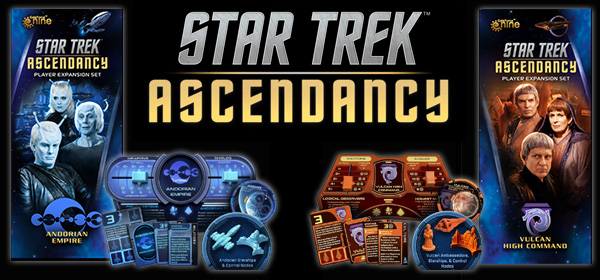
Star Trek: Ascendancy must be a more popular game than I thought. Usually I think of Star Trek games as being pretty niche and unlikely to find widespread success. But Ascendancy must be doing well because 8 years later, Gale Force 9 is still pumping out expansion packs and new accessories. Ascendancy deserves it. It's a fantastic game! In fact, it might very well be my favorite tabletop game at the moment.
The Vulcan and Andorian expansions were both released a few years ago, in 2019. But I couldn't review them near their release because I hadn't had an opportunity to play either of them until this past year or so. That's partly due to the fact that Gale Force 9's distribution isn't the best. The expansions were delayed several times, and my pre-orders were also late arriving. By the time I finally had them both, schedules just weren't favorable for playing. I had an opportunity to play with either faction within a few months of purchasing them, but we ended up sticking with the Ferengi and Cardassians.
We expected to play again soon and break in the Andorian and Vulcan sets, but then COVID happened. Ascendancy wasn't the only victim, as several other games (including Bloodborne, Tapestry, and U-Boot) have also sat un-opened or un-played since the summer of 2019.
Several games (or expansions) have sat un-opened or un-played since 2019 and 2021 thanks to COVID.
Now, GF9 has released another pair of expansions in 2022, with the Dominion War and Breen. This time, I didn't want to wait and risk letting them sit un-played for another 2 or 3 years, so we made sure to find time to play. Though reviews were still very late because I had 4 expansions to play and review instead of just 2. Which means it took quite a few play sessions to play everything and get a decent feel for it all.
It certainly helped that I introduced the game to some new players in the year or 2 following COVID, and they all loved it. I've now played with all the new factions and have impressions on all of them. I'll discuss the Dominion in a separate post, since the Dominion is a lot more complicated than simply being a new faction. It includes new rules for the Bajoran wormhole, Gamma Quadrant systems, and also includes a team variant game mode based on the Dominion War of Deep Space Nine. So for now, I'm going to cover the Andorians, Vulcans, and Breen.
Pre-Federation factions
The pair of 2019 expansions were both themed around Star Trek: Enterprise, offering versions of Federation-member cultures that represent their pre-Federation empires. I have to say, I was very surprised to see these factions be announced. Partly because they are both members of the Federation, and so don't seem like "big enough" galactic powers to warrant their own factions. To me, it seemed comparable to seeing the Virginia Commonwealth or Republic of Texas show up as a playable civilization in Sid Meier's Civilization.
But it was also a confounding release because I was expecting to see the Tholian faction that was promised by the base game's "Crystalline Entity" exploration card. I would have expected to see factions like the Dominion, Tholian, Gorn, or maybe even a Delta Quadrant faction like the Hirogen or Kazon, before seeing the Vulcans and Andorians show up as factions. Nevertheless, both introduce novel new gameplay mechanics and concepts, and show the development team at Gale Force 9 is getting quite creative with its faction concepts. [More]
c8602238-1f38-43f7-b62e-db5a7d8d9a68|0|.0
Tags:Star Trek, Star Trek: Ascendancy, Gale Force Nine, board game, expansion, Vulcan, Andorian, Breen, Dominion, lie, ambassador, research, isolationist

As my Patrons and YouTube viewers know, I've been working for the past several months on a lengthy retrospective of Star Trek video games. I currently have 2 preview clips of that lengthy retrospective project available to my Patrons, and I plan to give my Patrons exclusive early access to the entire completed project, while the general public will have each episode released one-at-a-time over the course of multiple weeks. So if you want a preview of that project, or early access when it is finished, you can become a Patron and support my content creation.
As part of that retrospective, I've bought a lot of old Star Trek games to play or re-play. A lot of these games are buggy, or don't run well on modern systems. The Steam version of Starfleet Command, for example, required me to modify an ini file in order to prevent the game from constantly crashing. But of all the old, crappy, or broken Star Trek games I've played, the absolute worst has been Star Trek: Bridge Crew for the PS4/PSVR.
I've been buying and playing old Star Trek games as research for a retrospective.
Bridge Crew is a multiplayer VR game that was released in 2017 by Ubisoft for PSVR and PC. It's a live-service game that uses both the PSN servers and Ubisoft Connect servers to run the multiplayer. I initially skipped this game back in 2017 for a couple reasons. The first is that I didn't have a VR headset. The second is that it was based on the reboot Kelvin-verse films, which simply didn't appeal to me as much as the Prime canon. But I found out recently that the game does actually have DLC that includes Original Series and Next Generation content. Armed now with a friend's PSVR headset and the more appealing prospect of playing VR on the bridge of the Original Enterprise and Enterprise-D, I decided to buy the game and give it a try.
Despite being a 6-year-old game on an obsolete console, Ubisoft and Sony are still charging full price for it, $30. So I assumed that the game must still be fully functional and playable. Or at least, I assumed the single-player would be. In fact, PSN actually lists the game as being a "1 player" game. I had no expectation that the game's multiplayer lobbies would be full of prospective playmates, but I figured that I could at least try out the single-player and see how far I could get.
I was more interested in Bridge Crew after discovering it has TOS and TNG DLC.
After playing through the tutorial and getting through the first 2 story campaign missions, I called it quits for the night. When I came back a couple days later, I found that none of my progress had been saved. The game was prompting me to do the tutorial before starting play, my rank had been reset, all the campaign missions after the first had re-locked, and even my avatar had been reset to a random face. Was there a manual save option in the menus that I had missed?
No, there wasn't. After some online research, I discovered that Ubisoft had recently ended official support for the game and had shut down the servers. Apparently, for the PS4 version of the game, all save progress was stored on the Ubisoft servers. With those servers now offline, game progress could no longer be saved. It's unclear to me whether the online multiplayer still works, as that may go through the PSN instead of Ubisoft's servers. There's nobody in the multiplayer lobbies, but it's unclear if that's because the lobbies go through servers that are offline, or if there simply isn't anybody trying to play the game anymore.
[More]
44f4f8ae-6b20-47f5-bd60-442e84203c2e|0|.0
Tags:Star Trek: Bridge Crew, Ubisoft, Star Trek, PSVR, PS4, PSN, multiplayer, save game, server, live service, Patreon
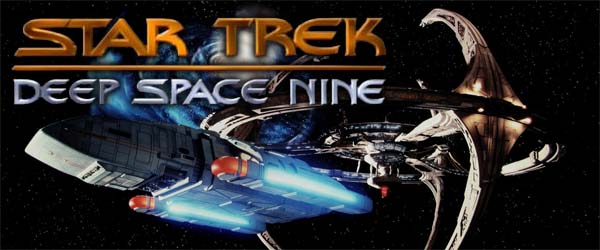
After posting 2 essays about how Deep Space Nine realizes the ideals of Star Trek and how it was ahead of its time, I would feel remiss if I concluded any discussion of the greatness of Star Trek Deep Space Nine without praising its outstanding cast of recurring guest actors and characters. Seriously, DS9's recurring guest characters are some of the true highlights of the entire show. Their natural charisma as performers is bolstered by the show's fundamental structure as a serialized story, and its setting on a stationary outpost. These two decisions in the design and production of the show allow guest characters to recur frequently, with their own storylines and arcs, and helps make them just as vital to the plot of the show as any of the main cast.
As mentioned previously, Deep Space Nine wasn't a starship like the Enterprise. It didn't have the luxury of sailing off into the sunset at the conclusion of every episode, leaving the people and problems of the episode behind. The crew of Deep Space Nine were stuck dealing with the long-term fallout of the events of any particular episode, and that included the circumstances of characters in the station's immediate neighborhood. Some of these characters come and go, leaving Deep Space Nine behind forever. But others become permanent fixtures on the show, almost as much a part of the main cast as Armin Shimerman or Andrew Robinson.
Being a stationary starbase, a diverse collection of guest characters repeatedly visit Deep Space 9.
The following post will discuss specific plot points regarding multiple guest characters, including some who don't appear until the later seasons of the series. As such, this post will have the most explicit story spoilers of any of these 3 Deep Space Nine retrospectives. Read on at your own risk.
Star Trek's best villain(s)
The highlight of Deep Space Nine's guest cast is its principle villain, the best villain in all of Star Trek: Gul Dukat.
Yes, you read that right. Dukat is Trek's best bad guy.
Dukat is better than Khan. Better than General Chang (but only barely). Better than the Borg (and their stupid queen). Certainly better than the Duras Sisters or any of Trek's rogues gallery of throwaway villains like Commander Kruge. He's better even than Q -- if you want to consider Q a "villain" to begin with.
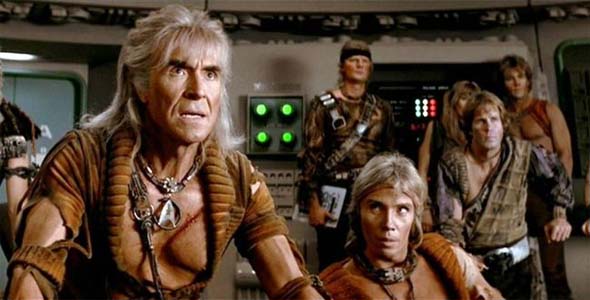 - Star Trek II: The Wrath of Khan, copyright Paramount Pictures.
- Star Trek II: The Wrath of Khan, copyright Paramount Pictures.
Sorry Khan, I do not think you are Star Trek's best villain. You're 2nd place, at best.
Yes, Dukat is my favorite Trek villain -- by a long shot. It's not even close. [More]
a258d721-4fc4-450e-b1ec-e89bbfc5cfb3|0|.0
Tags:Star Trek, Star Trek: Deep Space Nine, Deep Space Nine, space station, demagogue, Quark, Armin Shimerman, Garak, Andrew Robinson, Gul Dukat, Marc Alaimo, Kai Winn, Louise Fletcher, Weyoun, Grand Liquidator Brunt, Shran, Jeffrey Combs, Rom, Max Grodénchik, Nog, Aron Eisenberg, Grand Nagus Zek, Wallace Shawn, Ishka, Moogie, General Martok, J.G. Hertzler, Ziyal, Damar, Michael Eddington, Kenneth Marshall, Agent Sloan, Section 31, Vic Fontaine, Ezri Dax, Nicole de Boer

In the age of streaming and binge-watching here in the year 2023, long-form serialized television is now ubiquitous. Every network and streaming service has wanted its own blockbuster TV shows. Whether it's AMC's The Walking Dead and Breaking Bad, HBO's Game of Thrones, Sci-Fi's Battlestar Galactica, Netflix's House of Cards and Stranger Things, History's Vikings, and so forth, it seems that every big new show outside of sit-coms has a heavily-serialized format. Procedural dramas are going the way of the dinosaur.
Serialized, long-form television may be commonplace now, but back in the 1990's, it was virtually unheard of outside of daytime soap operas (such as Dallas and Dynasty) and the occasional network mini-series. At least, this was the case in the United States. British television has a much longer track record of serialized story-telling. A big part of why serialized television was uncommon was that the producer(s) of network syndicacted shows didn't have as much control over when its affiliates decided to air the shows, or how heavily they would market and advertise it. Furthermore, the networks or affiliates could change the time slot of the show pretty much at a whim. Viewership, therefore, would be much more fickle and fractured. Audiences would pop in and drop out. Expecting the audience to have seen every previous episode in preparation for this week's episode was a dangerous and risky expectation for a production studio. It's easy to lose viewers if none of them know what's going on.
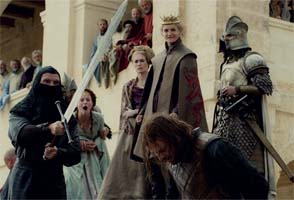 - Game Of Thrones, copyright HBO
- Game Of Thrones, copyright HBO
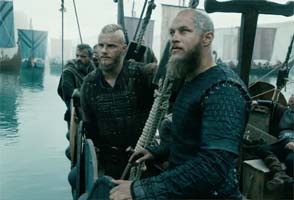 - Vikings, copyright History Channel
- Vikings, copyright History Channel
Highly serialized, long-form drama are the norm for modern networks and subscription television services.
As I mentioned in the previous essay, this was the case with me. I was in elementary school and middle school during DS9's run, and I missed a lot of episodes in the first couple seasons, despite wanting to watch the show. Missing so many episodes meant that I had very little idea what was going on when I would watch, and so I mostly lost interest in the show. If my dad was watching it, and I was there, I'd watch it, but I wasn't planning my day around it.
Looking back now, that sort of serialized story-telling is now ubiquitous and expected, and so it's easier to recognize that Deep Space Nine was truly innovative and ahead of its time in this regard.
Long-form story-telling
Serialized story-telling wasn't alien to Star Trek. Deep Space Nine premiered in 1993, the same year as the sixth season of Next Generation. By this time, The Next Generation had several story threads that had recurred over the course of a season, or over multiple seasons -- as well as several attempted overarching plot threads that were dropped.
As early as the first season of Next Generation, Q had become a recurring antagonist, and his "judgement" over the human race was established as a recurring plot thread. Heck Q's judgement of humanity was originally depicted as the framing mechanism for the entire show! It was scaled back in the following seasons due to the general poor reception of the first season, and the fact that John de Lancie just works better in a more whimsical and comic role.
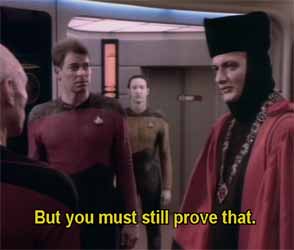 - TNG "Encounter At Farpoint", season 1, episode 1
- TNG "Encounter At Farpoint", season 1, episode 1
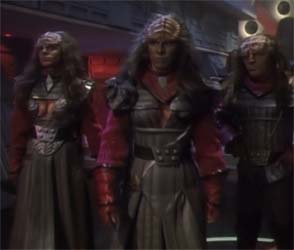 - TNG "Redemption, Part I", season 4, episode 26
- TNG "Redemption, Part I", season 4, episode 26
TNG had several recurring plot threads.
The final two episodes of Next Generation's first season, "Conspiracy" and "The Neutral Zone", seem to have been part of an abandoned attempt at more long-form story-telling. Both seem to be trying to establish some new threat to the Federation (and possibly a shared threat between the Federation and other rival powers such as the Romulans). I think the original idea was for this to become an overarching storyline for the entire series. But the thread from "Conspiracy" was completely dropped, and the destroyed colonies referenced in "The Neutral Zone" were re-written to be retroactive foreshadowing of the Borg's appearance in season 2.
[More]
cddb26c9-ca5a-4327-b199-d0d00dec522b|0|.0
Tags:Star Trek, Star Trek: Deep Space Nine, Federation, Starfleet, progressivism, humanism, secularism, religion, fundamentalism, fascism, terrorism, war, trans-gender, Worf, Odo, Quark, Moogie, Ishka, Bajor, Dominion, Founder, Changeling, Jem'Hadar, Cardassian, streaming television, Game of Thrones, Battlestar Galactica, the X-Files, Babylon 5, Buffy the Vampire Slayer, The Sopranos, Lost, Twin Peaks

The Next Generation, Deep Space Nine, and (depending on who you talk to) Voyager are widely regarded as the "Golden Age" of Star Trek. Since many Trekkies look back at this time period of the late 80's and 90's with the rose-tinted glasses of nostalgia, it might surprise you to read that Deep Space Nine used to be a highly divisive topic among Star Trek fans. Even to this day, I've talked to "hardcore" Trek purists who dislike Deep Space Nine because of how dark and conflict-driven the series is. I can't imagine what these people must think of the Kelvin-verse reboots, Star Trek: Discovery, or Picard. If you think I'm hard on those recent iterations of Star Trek, then you should talk to these people!
In any case, the idea that DS9 is too dark and conflict-driven is a valid criticism from someone coming from the perspective of a fan of The Original Series and Next Generation. Both of those shows were about an idealistic future in which humanity had grown out of its petty squabbles and now seeks to better itself through cooperative exploration and colonization of space. Deep Space Nine didn't quite accept those ideas at face-value. Deep Space Nine's more pragmatic approach had some fans believing that Deep Space Nine violated the spirit of Star Trek.
Many fans of The Original Series and Next Generation criticized Deep Space 9 for being "too dark".
Deep Space Nine was also the first Trek series to be highly serialized, having a singular, overarching plot throughout most of the series, and with frequent mini-arcs running for half a season or a whole season. TNG had its share of recurrent story arcs. Q's "trial of humanity" was pitched as a framing mechanism for the entire show, but ended up only serving to bookend the series, while relegating most of Q's appearances each season as comic tangents. There were other recurrent sub-plots as well, such as Worf's discommendation from the Klingon Empire and his conflict with the Duras House in the "Sins of the Father" arc, the Borg story thread, Data's relationship with his brother Lore, Wesley's training as a Starfleet officer, and a few others. But TNG stayed mostly episodic. Almost all the single episodes of TNG (and the two-parters as a whole) can be enjoyed independently, without having seen any previous episodes of TNG. That was not the case with DS9.
I missed many episodes of DS9 because
it aired on weekend evenings.
DS9 was on the air throughout my elementary school and middle school years (I was seven when the show premiered). It frequently aired (syndicated on Fox in my region) on weekend evenings, and I was often outside playing tag, riding bikes, or playing touch football or street basketball with neighbor kids. As such, I missed a lot of episodes. Due to the highly-serialized nature of the show, when I would see an episode, I would have no idea what was going on! Because I rarely watched the show, and didn't understand it when I did see it, I didn't particularly like it. I'd still watch it, because it was still Star Trek. In fact, Voyager was the first Star Trek series that I watched regularly (it being on Wednesday nights, when I wasn't outside playing), and, well, you all know how I feel about Voyager.
In fact, I grew up with a bit of a preconceived notion that Deep Space Nine was the "bad" Star Trek series -- even though critics at the time largely appreciated it. On the off chance that I could talk about Star Trek with a peer, they generally didn't like DS9 either -- for many of the same reasons.
It wasn't until my college years, when the show was released for sale on DVD that I sat down and watched the whole series from start to finish. At first, I wasn't even sure if I wanted to bother buying the DVDs. After all, DS9 was "the bad Star Trek". So why spend the money? And those DVDs cost a lot of money! CBS wanted something like $120 for a single season, compared to $30 or $40 a season for shows like E.R. or Grey's Anatomy. At least the Next Gen DVDs came in fancy, sturdy boxes. The DS9 DVDs came in cheap, flimsy, rigid plastic booklets that start to fall apart as soon as you open them. I think my mom bought them from Costco for $90 a pop -- a considerable discount, but still obnoxiously expensive!
CBS wanted $120 per season for DS9 DVDs!
I was now older. I was coming to terms with my personal identity as a progressive secular humanist. Most importantly, I could finally follow along with the various multi-episode story threads and the complex, nuanced characterizations. And boy, did my opinions on the series change!
I'll always have a soft spot for Next Generation. That show has my favorite Trek character: Data. And Picard is probably my third favorite character after Spock. After my single favorite episode of Trek, the Original Series' "Balance of Terror", most of my runner-up favorite episodes are TNG episodes. Episodes like "The Measure of a Man", "Who Watches the Watchers", "The Offspring", "The Best of Both Worlds", "Deja Q", "I, Borg", "Tapestry", "The Inner Light", "Darmok", "All Good Things...", and so on...
Despite my fondness for Next Generation, I actually think that Deep Space Nine is the better all-around show.
Every Trek series since the original has taken a couple years to really find its footing. TNG doesn't really figure itself out until midway through season 2, and Voyager takes until the 4th season to figure itself out -- if ever. I don't know if Discovery ever righted its ship, since I didn't bother to watch past the first season, and Picard didn't even become watchable until the third season. I feel like DS9 finds its footing much earlier than TNG or Voyager. Deep Space Nine's characters, themes, and stories start to fall in place by the end of season 1. In fact, one of my favorite episodes of the entire series (and one of my favorite episodes of Trek in general) is a season 1 episode: "Duet". DS9 is the only Trek series (since the original) for which one of my favorite episodes comes as early as the first season.
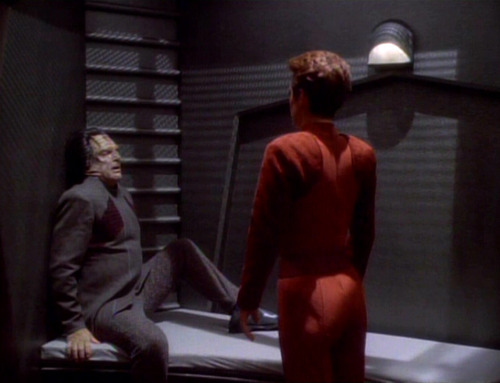 - DS9 "Duet", season 1, episode 19
- DS9 "Duet", season 1, episode 19
One of my favorite DS9 episodes (and Trek episodes in general) is the season 1 Holocaust allegory, "Duet".
The last episode of season 1, "In the Hands of the Prophets" starts to set up the season-long arcs (and a series-long arc) that would become a trademark of the series. That episode introduces us to recurring villain Vedek Winn and starts the process of her gradual accumulation of power, which we'll talk about later.
But despite the series coming together better in the first season, critics of Deep Space Nine aren't wrong when they say that it "feels different" from the Original Series or Next Generation. The show is unarguably darker and more conflict-driven. The entire second half of the series is about an interstellar war, and the seasons leading up to that repeatedly tell stories about domestic terrorism, Holocaust allegories, religious persecution, and cynical politics. These sorts of themes were present in episodes of TOS and TNG here and there, but DS9, at a fundamental level, was about these difficult topics.
[More]
79b833d8-97bd-4e2f-b45e-9f666db1588a|1|5.0
Tags:Star Trek, Star Trek: Deep Space Nine, Gene Roddenberry, Federation, Starfleet, culture, ideals, cooperation, socialism, post-scarcity economics, alien, multi-culturalism, progressivism, humanism, secularism, terrorism, war, Benjamin Sisko, Kasidy Yates, Odo, Quark, Ferengi, Klingon, Cardassian, Dominion, Bajor
|

| 12 | | | | | | | 60 | | 11 | | | | | | | 55 | | 10 | | | | | | | 50 | | 09 | | | | | | | 45 | | 08 | | | | | | | 40 | | 07 | | | | | | | 35 | | 06 | | | | | | | 30 | | 05 | | | | | | | 25 | | 04 | | | | | | | 20 | | 03 | | | | | | | 15 | | 02 | | | | | | | 10 | | 01 | | | | | | | 05 |
|